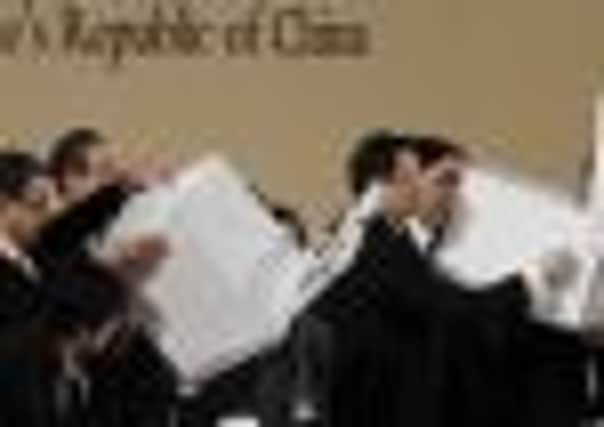Hong Kong’s elite elect new leader


Leung Chun-ying, 57, was declared the territory’s next chief executive after securing 689 votes from a 1,200-seat committee of business leaders and other elites, most of them loyal to Beijing. Initially considered the underdog, Leung gained the support of China’s Communist leaders, who backed off their deeply unpopular first choice, Henry Tang.
Hong Kong’s 7.1 million ordinary residents, who had no say, used a mock poll to show their unhappiness over an undemocratic vote in which the two main candidates were establishment figures acceptable to Beijing. About 55 per cent of the 222,990 votes cast were blank in the poll conducted by Hong Kong University researchers.
Advertisement
Hide AdAdvertisement
Hide AdLeung, a property surveyor who’s known as C.Y., bowed deeply three times to election committee members after his victory was declared. Tang received 285 votes. Pro-democracy candidate Albert Ho, who had no chance of winning, got 76 votes. Another 82 of the 1,132 total votes cast were deemed invalid – most were blank.
Hundreds of pro-democracy protesters gathered at the large waterfront convention centre where the vote was held, waving banners and chanting slogans calling for “One person, one vote to choose the chief executive.”
Tang, whose backers include Li Ka-shing, Hong Kong’s richest man, was seen early on as Beijing’s preferred candidate. But Tang, the heir to a textile fortune, was hit by a string of gaffes and scandals that torpedoed his approval rating.
The scandals also added to wider public discontent, driven by a yawning rich-poor gap and sky-high housing prices that have stirred popular resentment of the city’s billionaires and their close ties with the government.
Beijing’s decision to switch to Leung, the son of a police officer, in the days leading up to the vote indicated China’s leaders think public opinion is still important. Leung’s pledges to speed up social reforms and expand public housing have annoyed the city’s tycoons but pleased ordinary Hong Kongers.
Hong Kong is an unrestrained global capital of commerce with Western-style rights and freedoms not seen on the mainland. But it has never had full democracy. Beijing has promised universal suffrage for 2017, when Leung’s five-year term ends, but no plan has been laid out.
“To the people who are shouting and protesting outside – yes they do have a vote, they do have a voice, yes they are part of Hong Kong,” said the victorious Leung.